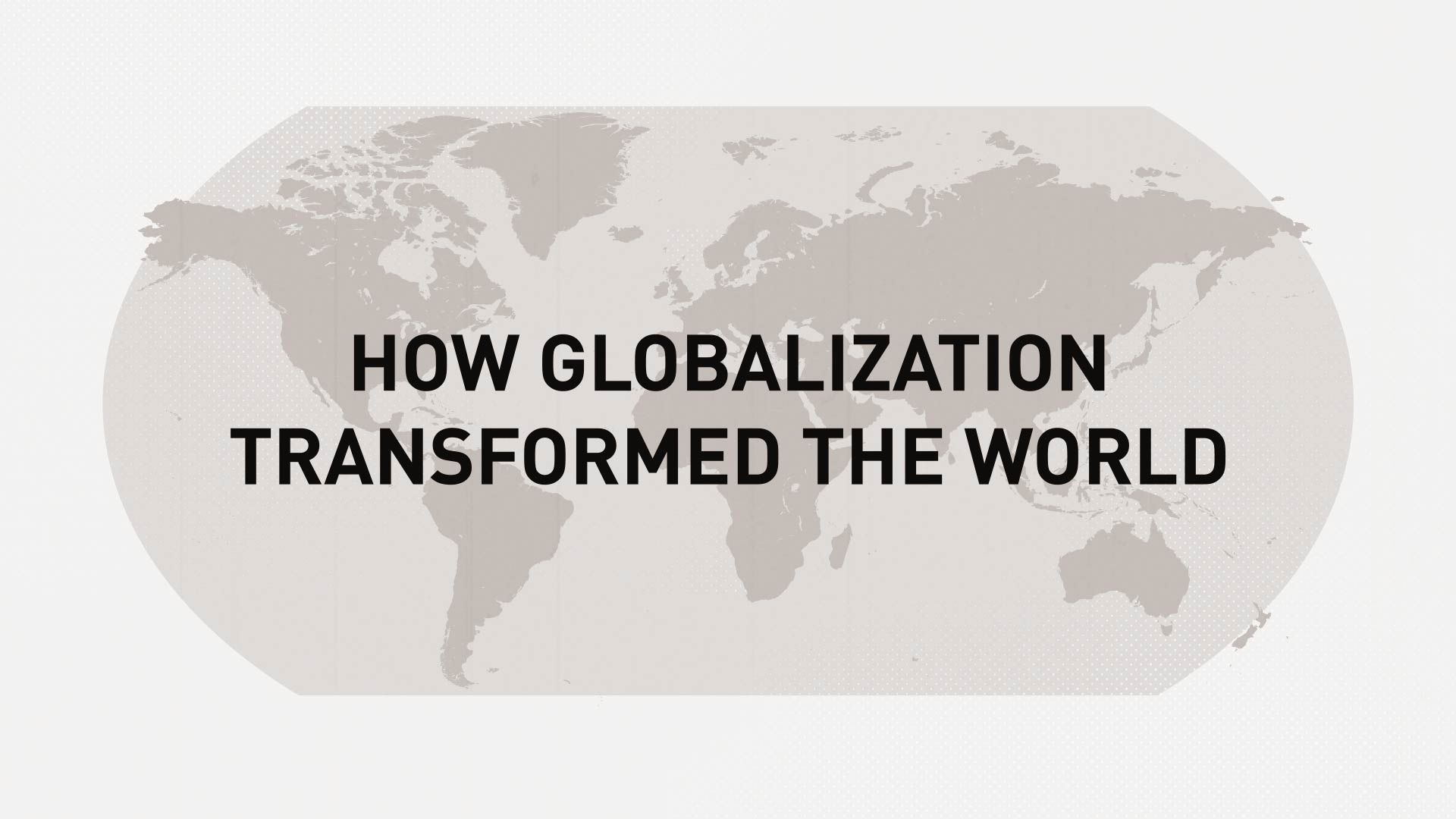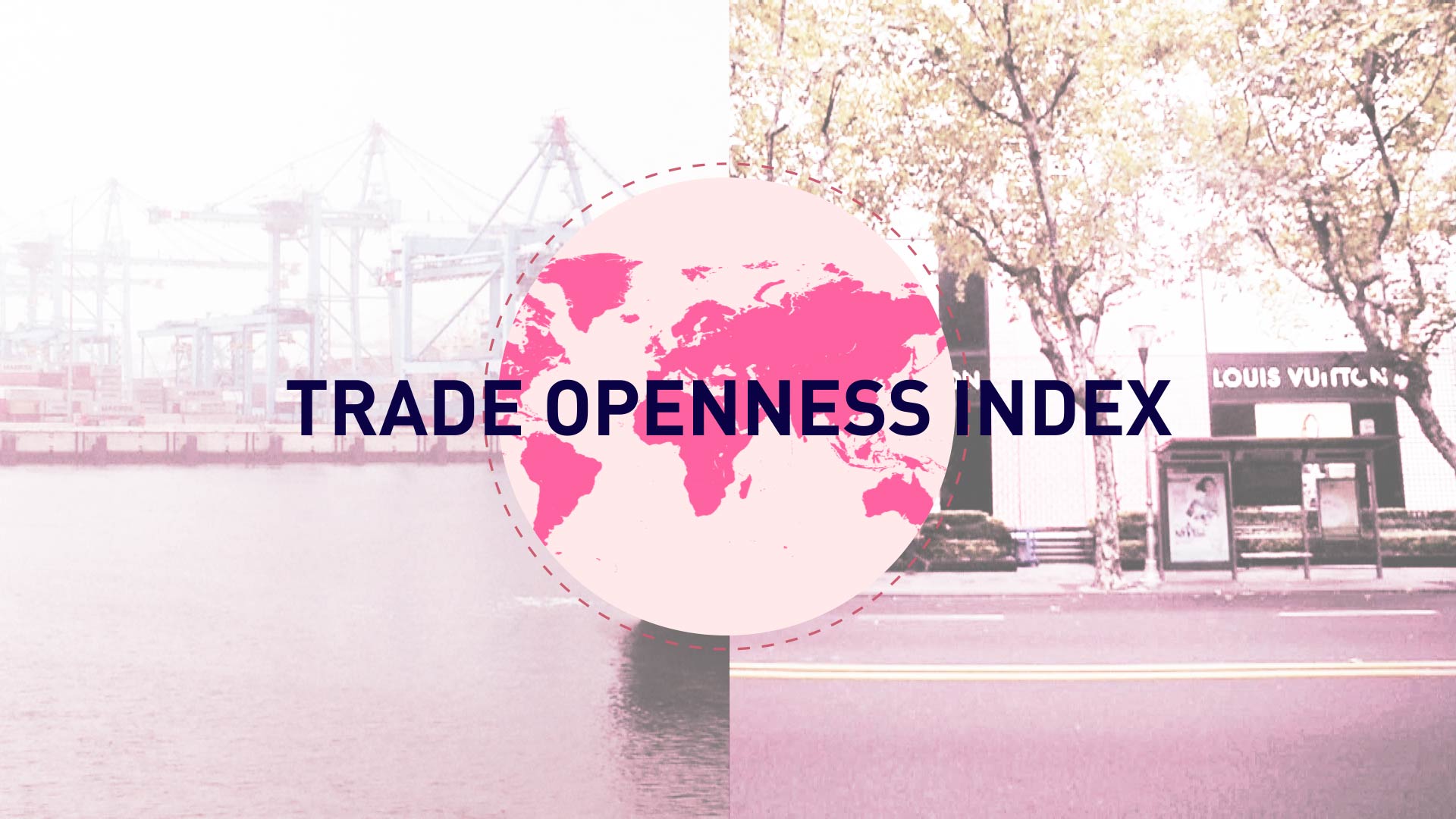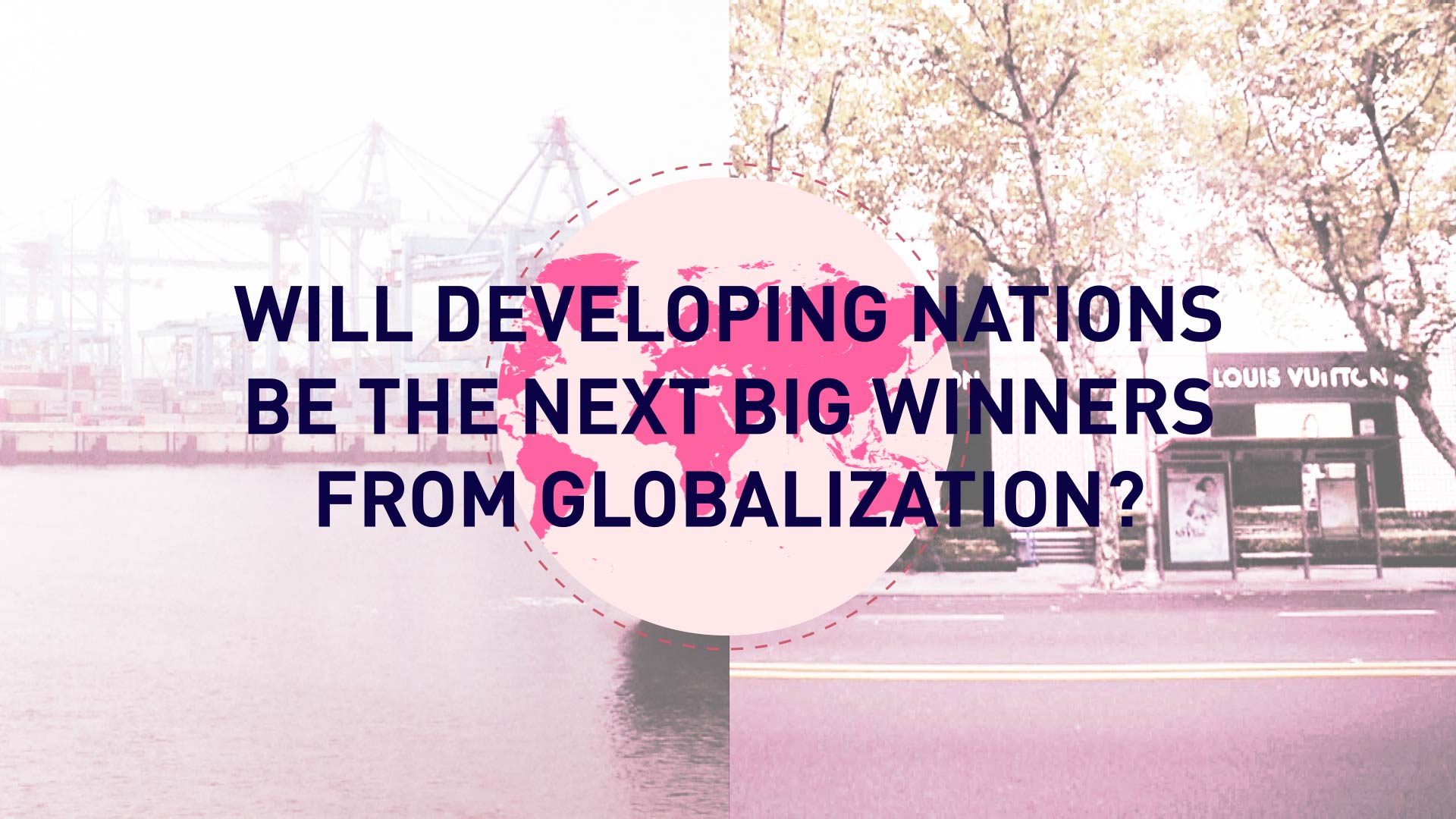For two centuries, the world has headed towards globalization. Advances in transport, manufacturing and distribution – not to mention sales and marketing – have allowed the planet's burgeoning population to collect more possessions than at any point in history – and relatively affordably, too.
However, the future of globalization is far from sure. Many of the world's long-established powers are having to come to terms with a post-industrial economy, and some of the more populist leaders are courting support by considering protectionist measures which promise – however hollowly – to restore domestic productivity at the expense of international trade.
Compounding the concerns, 2020 has brought a global pandemic, which has re-erected long-dormant borders, exposed supply-chain problems, provoked arguments between countries where citizens have been bickering over protective equipment and underlined the doubts over the future of globalization. Has it passed its peak? How did we get to here? And what happens next?
The origins of globalization
To understand globalization, we have to learn the golden rule of why it happens. And to understand that, we have to meet a fascinating character born 250 years ago.
David Ricardo knew something about crossing borders: he was born in London in 1772 to a family of Sephardi Jews of Portuguese origin who had arrived in Britain from the Netherlands. He knew something about trading: his father was a successful stockbroker and David Ricardo himself learnt the ropes at his father's side from the age of 14, later making enough money speculating on the battle of Waterloo to retire early.

In 1817, David Ricardo's groundbreaking new theory paved the way for globalization. /Thomas Phillips/National Portrait Gallery
In 1817, David Ricardo's groundbreaking new theory paved the way for globalization. /Thomas Phillips/National Portrait Gallery
Ricardo was also a deep thinker – an abolitionist and a geologist, he was a friend of James Mill, Thomas Malthus and Jeremy Bentham, an Age of Enlightenment brains trust roaming the fertile borderlands between philosophy and economics. And Ricardo's greatest theory was born of a fierce belief in free trade, as opposed to the protectionist tariffs then used by most countries around the world.
Published in 1817, his beautifully simple theory of "comparative advantage" merely says that if one country can produce specific goods (or services) at a lower cost than other countries, it will produce more and (under free trade) export more – with a resultant increase in economic welfare.
Challenging the then-predominant idea that trade existed merely to make a few people richer, Ricardo argued that free trade and industrial specialization could improve everyone's wealth because countries would no longer be forced to uneconomically produce goods they could get from elsewhere.
This was a sea change in attitudes. Previously, countries had limited imports through tariffs and taxes, under the assumption that giving other countries money was a bad thing. However, the mercantile class realized the possibilities of the export market, while entire populations were freed from the necessity of wasting money on either inferior domestic produce or artificially expensive foreign imports.
00:16

The effects were notable and long-lasting. The 19th century brought an exponential boom in global trade – think for example of clipper ships racing each other around the world – and the inflation-adjusted value of global exports rose thirtyfold from 1800 to 1900, according to World Bank data.
In the first half of the 20th century, export growth was slowed by two world wars, a great depression and a rise in nationalism – but since 1950, exports have grown thirtyfold again, from a much higher baseline. While consumerism increased demand, containerization improved logistics and by the early 1990s, sociologists such as Martin Albrow were using the term "globalization."
Now a fellow of British Academy of Social Sciences, Albrow tells CGTN he remains convinced of the benefits of globalization, which he says "has contributed to a more open world, a world which is richer in terms of experience and in products and in standard of living." For Albrow, "the world does become richer through globalization – and Europe has benefited enormously from that."

Containerization has made the global movement of goods economically viable. /Cameron Davidson/Corbis Editorial
Containerization has made the global movement of goods economically viable. /Cameron Davidson/Corbis Editorial
Trade openness
One way to measure the importance of international trade to any given country is to check the ratio of its total trade (exports plus imports) to its gross domestic product; the higher the number, the greater the influence trade has on the country's economy.
This is known as the trade openness index, and it illustrates some interesting variations in the last half-century or so, as CGTN's animation shows. When the world was divided into trading blocs, international trade was stifled – and the U.S. number is lower than other rich countries because the majority of its products and services are consumed domestically.
00:51

With some exceptions, the general trend has been toward greater openness, but since the 1990s more and more countries have moved toward globalization and international trade has boomed: whereas headline figures can be swollen by a few heavy traders, the map shows how widespread this is.
By the modern day, almost all countries are producing much more than in 1960, and trading it with other countries – as Our World in Data notes, "the sum of exports and imports across nations amounts to more than 50 percent of the value of total global output" – fulfilling Ricardo's prediction that by concentrating on its comparative advantage, each country can prosper.
The problem(s) with globalization
However, not all economists think globalization can continue on its present course. Harvard professor Dani Rodrik has expressed the uncomfortable relationship between geopolitics and macroeconomics as the trilemma theory, reasoning that "If we want more globalization, we must either give up some democracy or some national sovereignty."
The latter is perhaps unlikely when a swing toward populist politics, often divisive and isolationist, has risked dumbing down a complex economic conversation to the overly simplistic old notion of imports being bad. It's a development that worries Jim O'Neill, the British economist perhaps best known for his 2001 coining of the term BRICs for the rising economic powers of Brazil, Russia, India and China.
"We have in many countries these days a lot of 'strongmen' political leaders who perceive it is to their benefit to talk like tough guys and imply that they're going to restrict trade with the rest of the world – supposedly with some promise that it will create more jobs and a stronger country in their own society," O'Neill tells CGTN. "It's quite a clever political message but it doesn't really end up delivering success."
Albrow thinks the problem is not necessarily resurgent protectionism as ingrained insularity. "Europe is not yet fulfilling its full role in the world – it doesn't look outwards enough," he tells CGTN. "It is concerned far too much with relations between its member countries and not enough with how collectively Europe should be contributing to the world – for instance, taking a leadership role in something like climate change."

With the advent of huge ships, cars can be exported economically. /Steve Proehl/Corbis Editorial
With the advent of huge ships, cars can be exported economically. /Steve Proehl/Corbis Editorial
That globalization has negative impacts is unarguable, although arguments certainly abound between theorists and practitioners as to their importance. Coined in the early 1990s by food policy professor Tim Lang, the phrase "food miles" encapsulates various concerns: the environmental damage of shipping comestibles around the planet, potential concerns over the processing and preservatives required for just-in-time delivery, and the inherent danger of monocultures.
This last point is the inevitable corollary of the comparative-advantage vision, the point at which Ricardo's dream tips into a nightmare: what happens if the product an economy is geared to providing suddenly becomes available more cheaply elsewhere?
It is not a mere theoretical point: in the race to the bottom, there are many losers. It is well documented that the heavy industry formerly concentrated in Western nations was undercut from elsewhere, but the process continues as ever-cheaper production sources are found.
Journalist Martin Jacques has noted than when consumerism continues to encourage price suppression – "the price of clothing and shoes in the U.S., for example, fell by 30 percent in the first decade of this century" – then "the main losers hitherto have been those developing countries, like Mexico, whose comparative advantage lies in similar labor-intensive production and who find themselves in direct competition."

Fueled by the postwar car boom, Detroit was once one of the world's richest cities. Now much of it lies abandoned, like the formerly 4,000-seat Michigan Theatre. /Bradley Garrett/eyevine/VCG
Fueled by the postwar car boom, Detroit was once one of the world's richest cities. Now much of it lies abandoned, like the formerly 4,000-seat Michigan Theatre. /Bradley Garrett/eyevine/VCG
With less money going in, less money reaches the labor force. For Erik Berglof, director of the London School of Economics' Institute of Global Affairs, the problem with globalization is wealth distribution, or rather the lack of it.
"Globalization is not an end in itself," he tells CGTN. "We want it to create more prosperity but to increase income for folks on the lowest tax rate you need to have a more inclusive globalization."
A new world order?
Even so, O'Neill refutes Rodrik's rubric that the free trade era is over. "I'm very skeptical about this very generalized view about so-called deglobalization," he says. "Some people would think the period from 2000 to 2008 was the magical era of globalization but I think it's a lot more complicated."
O'Neill does agree that things are changing as economies mature. "The role involving China as a major supply chain for the rest of the world probably has peaked," he says, "because China is still shifting through a different economic model, which is not so based on a low value export to the rest of the world."
The patterns of international trade have been shifting for decades. In a 2016 study, Michel Fouquin and Jules Hugot examined the nature of global trade by dividing the world into "rich countries" – Australia, Canada, Israel, Japan, Western Europe and the U.S. – and the rest.
They found that in the 1950s the vast majority of trade transactions were between rich nations, but other economies have developed at a faster rate. The benefit of playing catch-up is that you can learn from the successes and failures of others, quickly adopting technologies, techniques and modernizations that took years of trial and effort.
As Jacques tells CGTN: "They can jump stages, particularly technologically. They never really needed to go through fixed phone lines, they can go straight to mobile technology."
00:50

In 2013, for the first time, trade between non-rich countries surpassed that between rich countries. This could be the blueprint for the future of globalization, whether those previous leaders like it or not: even if richer nations step back from globalization, others will continue to trade and prosper – with or without them.
In 2017, per the IMF, seven of the fastest-growing economies were in Africa; according to the UNDP, in 1992 trade between China and Sub-Saharan Africa was $1 billion, and by 2014 it was $170 billion. Chinese firms have been at the forefront of developing infrastructure on a continent where the nations are increasingly working and trading together: intended to unite all 55 African Union member states, the African Continental Free Trade Area would create the world's largest free-trade bloc, a market of 1.2 billion people.
Protective or overprotective?
There are certainly weaknesses in the supply chains, as startlingly demonstrated by the struggle to get sufficient personal protective equipment (PPE) even in rich countries which have become accustomed to apparently unlimited service.
While many anti-globalization campaigns have centered on vague notions of reigniting long-dead industries, the acute and frightening nature of a pandemic has added extra impetus and focus. However, for Albrow, the PPE shortages are not so much a shortcoming of globalization as a shortage of it.
"It reveals that the medical supplies themselves are not yet fully globalized," he insists. "The global market in medical supplies is obviously imperfect, it's probably too controlled by particular agencies, particularly corporations."

In April, British Airways used passenger planes to carry much-needed PPE equipment to the UK from China. /British Airways
In April, British Airways used passenger planes to carry much-needed PPE equipment to the UK from China. /British Airways
Former UK prime minister Tony Blair understands the desire for self-sufficiency – to a point. In an interview for a Financial Times webinar, Blair called it "perfectly rational and not nationalistic – just, practically, countries will want to be less dependent on sourcing stuff from abroad.
"If I was back in government today, I would be saying on certain key things – masks, protective equipment, probably ventilating capacity, maybe one or two other things – I'd want to make sure that we have the capability of manufacturing here. I wouldn't want to be in a situation again where you're scrambling in airports around the world trying to load the equipment on to your planes while other people are trying to outbid you, buy stocks and get it for their own country."
However, Blair is wary of isolationism threatening the economy. "If countries start to decide, 'right, we really want to reduce our reliance on imports across a whole range of things' – nothing to do with healthcare or with pandemics – then you've got to study carefully the consequences of that. If you get into effectively a kind of trade war, that could do real damage to the global economy."
The future of globalization
Global trade has come a long way in the two centuries since Ricardo described comparative advantage. Its recent history has involved some major changes, and the future of globalization is a subject of fierce debate among the experts.
Erik Berglof worries "that global value chains tend to create inequality in countries – we need to be much more sensitive to that. But I think that's not the major threat to globalization. I think that is coming, unfortunately, from the relationship between China and the U.S. – and unless the U.S. recovers, I think we will have a long period of less rapidly growing and maybe even decreasing globalization."
Asked about Rodrik's trilemma theory, Martin Albrow widens out the concept beyond the mere trading of goods: "Economic globalization is not just about trade. Economy is made up of labor, capital and production, and those things can be global without any trade. You don't need trade in goods to have global movement of capital, labor and knowledge."

Globalization is not just about goods: thousands of Chinese students attend university in the UK. /Dave Tacon/Polaris
Globalization is not just about goods: thousands of Chinese students attend university in the UK. /Dave Tacon/Polaris
For Martin Jacques, the question hanging over globalization is not whether but where – and he is unequivocal. "Belt & Road is extremely important for the future of Europe. The source of Europe's growth for the future is no longer Westwards, it's no longer the U.S., it's across the Eurasian landmass. Europe has to find new sources of growth, and they lie to the East, not to the West."
While Ricardo saw the benefits of free trade from the traders' perspective, O'Neill says the customer drives the market. For him, the desire to acquire will transcend any problems.
"Globalization essentially depends on individual consumers all over the world wanting to consume what they can see and believing that is the best thing they can get at the most affordable prices," he says. "Unless we have a world where consumers no longer want to consume lots of things they can get from other parts of the world, globalization will evolve and change as it's done for many, many decades."
Remember to sign up to Global Business Daily here to get our top headlines direct to your inbox every weekday
Animations by James Sandifer. Interviews by Xi Jia